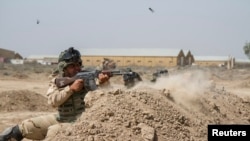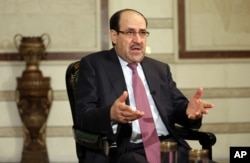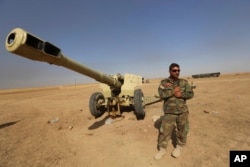Republican and Democratic presidential candidates hold starkly different opinions on many political issues, but they are in broad agreement on the need for the U.S. to play a role in defeating the Islamic State terrorist group. That means the U.S. will most likely have a major role in Iraq in the coming years, regardless of who wins the general election in November.
Kenneth Pollack, a senior fellow in foreign policy at the Brookings Institution, a Washington policy and research group, said the most important thing for the next president to understand when shaping U.S. strategy is that it was Iraq's civil war that enabled ISIS to make its gains in the country. He said that's why the U.S. should deal with the widespread sectarian strife between Sunnis and Shi'ites.
"The U.S. must forge a power-sharing agreement among the various groups so that they all have an equitable stake in a new government." Pollack said. "The real key is a political reconciliation among Sunnis and Shi'ites, as well as some solution to the Kurdish question."
The big challenge in defeating ISIS is finding a way to incentivize the Sunni population to reject the group, according to retired Lieutenant General Michael Barbero, a former Multi-National Force-Iraq deputy chief of staff.
“The Sunni population does not believe that the Iraqi government will act in their interest,” Barbero said. “So the first order is to convince the Sunni population that they need to work with the government in Baghdad, and you don’t do that by sending in Shi'ite militias.”
Failure exploited
Ryan Crocker, a former U.S. ambassador to Iraq in the George W. Bush administration, agreed.
“ISIS had taken root in Iraq by exploiting the failure of governance and alienation of the Sunni population, largely as a consequence of former Prime Minister Nouri al-Maliki’s sectarian policies,” he said.
The three experts agreed that shepherding Iraq out of its civil war would require a U.S. role in shaping a new power-sharing agreement defining both the minimal needs and the potential areas of agreement among the various Shi'ite and Sunni factions.
This, in turn, would make it much easier for the Abadi government and the United States to create Sunni-majority military units, who would better be able to liberate the Sunni-majority areas of the country from ISIS.
Military role
The American public does not favor sending U.S. ground troops to Iraq. However, the experts offered some alternatives that could help Iraq uproot ISIS fighters.
Barbero said the U.S. should rely on Iraqi security forces that have taken the lead in liberating the western city of Ramadi, less than 100 miles from Baghdad, from ISIS.
“The only thing that will really defeat ISIS is a viable ground force, so the Iraqi security forces have to be highly trained and well-equipped,” he said.
Barbero stressed the need for more U.S. front-line advisers, better intelligence presence on the ground, logistical support and a greater effort to identify targets.
Pollack argued that on the military side, the U.S. has a lot to offer.
“Train a limited number of English-speaking Iraqis to serve as forward air controllers; provide significantly more advisers out in the field accompanying Iraqi forces who can call in airstrikes; and more equipment could be provided,” he said.
Defining U.S. role
The experts agreed that the U.S. can’t disengage from Iraq and therefore needs a coherent strategy to define its role in the future of Iraq.
“It is very important for the new president to get more involved in Iraq politically to help the Iraqis overcome their suspicion and distrust and forge a new power-sharing agreement as a basis for a stable, peaceful Iraq,” Pollack said.
However, he said, there is a high likelihood that at some point, perhaps soon, Iraqi Kurds will push for independence.
“But for Sunni and Shi'ite Iraqis, it is entirely possible to imagine [the Kurds] remaining part of a unified Iraq if the U.S. could facilitate a deal whereby political power and economic benefits are distributed equitably across the population,” Pollack added.
For Barbero, a coherent strategy that the next administration could adopt would rely on greater U.S. involvement and investment in Iraq — "increased military support, accelerated development of the Iraqi security forces, speedy economic investment to rebuild liberated areas from ISIS."
Essential services
Another important challenge cited by the experts is building the Iraqi government’s capacity to provide essential services, including water, electricity and sanitation. They said this challenge has been compounded by the devastation ISIS and the military operations to dislodge it have wrought upon major Iraqi cities.
Crocker offered yet another aspect that the next U.S. president should take into consideration.
"Anyone who thought that the Iran nuclear deal was going to herald a new era of a gentler, kinder Iran in the region is nuts," he said. "What you’re seeing now in Iraq is the old Iranian playbook that they began to write in the early ’80s."
Crocker indicated that there's a need to foil an expanded Iranian role in Iraq. "Qassem Suleimani, the Iranian Quds Force commander, is seeking to achieve what Iran could not in the 1980s: to gain a definitive victory over Iraq by fragmenting it,” he said.
Crocker warned against repeating an American policy mistake from the past: "As the United States withdrew from Iraq, it ceded the battlefield to Iran and its proxies in the center and south, and to ISIS in the west.”












